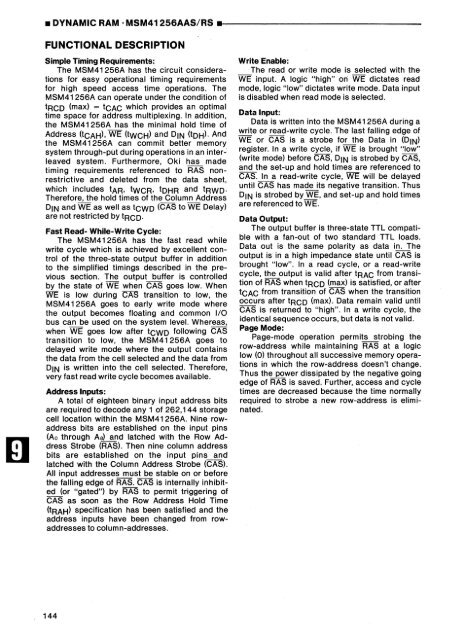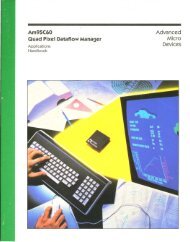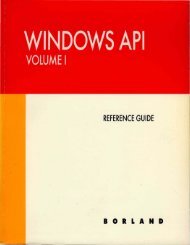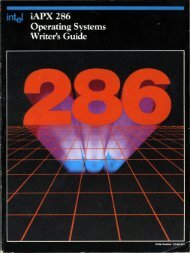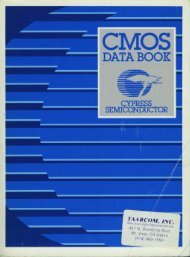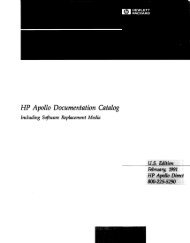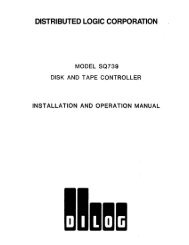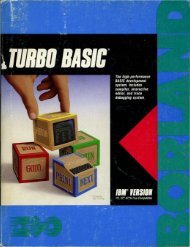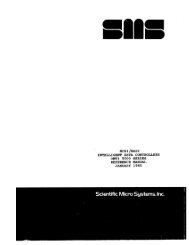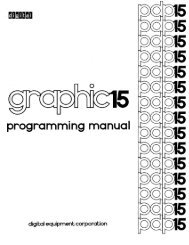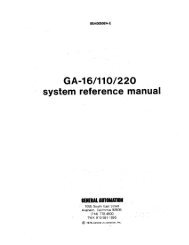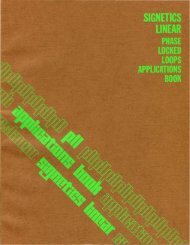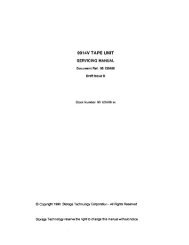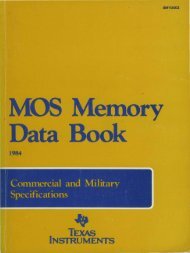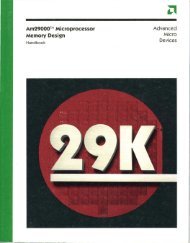- Page 1 and 2:
MEMORYDATABOOK1986
- Page 4 and 5:
CONTENTSo IC MEMORY LINE-UP AND TYP
- Page 6:
MSM28201 AASMSM53256RSMSK531000RS
- Page 10 and 11:
IC MEMORY LINE-UP AND TYPICALCHARAC
- Page 12 and 13:
---------.IC MEMORY LINE-UP AND TYP
- Page 14 and 15:
---------I.IC MEMORY LINE-UP AND TY
- Page 16:
----------_IC MEMORY LINE-UP AND TY
- Page 20 and 21:
PACKAGINGPACKAGESNo. RS GS JS US YS
- Page 22 and 23:
-----------------------------------
- Page 24 and 25:
~----------------------------------
- Page 26 and 27:
-----------------------------------
- Page 28 and 29:
------------------.PACKAGING ••
- Page 31 and 32:
oIIIRELIABILITY INFORMATION .......
- Page 33 and 34:
I\JOl~rt-ProcessmentAcceptanceof or
- Page 35 and 36:
• RELIABILITY INFORMATION ••
- Page 37 and 38:
• RELIABILITY INFORMATION ••
- Page 39 and 40:
• RELIABILITY INFORMATION .'-----
- Page 41 and 42:
D MOS MEMORY HANDLING PRECAUTIONS .
- Page 45 and 46:
D EPROM WRITING AND ERASURE .......
- Page 47:
• EPROM WRITING AND ERASURE •
- Page 50 and 51:
MASK ROM CUSTOMER PROGRAMSPECIFICAT
- Page 53 and 54:
DD MASK ROM DEVELOPMENT FLOWCHART..
- Page 57 and 58:
D TERMINOLOGY AND SYMBOLS .........
- Page 59 and 60:
.TERMINOLOGYANDSyMBOLS.------------
- Page 61 and 62:
• TERMINOLOGY AND SYMBOLS ... ---
- Page 63:
_TERMINOLOGY AND SYMBOLS _._-------
- Page 66 and 67:
MOSDYNAMICRAMS
- Page 68 and 69:
----------------... DYNAMIC RAM· M
- Page 70 and 71:
----------------.... DYNAMIC RAM .
- Page 72 and 73:
----------------.... DYNAMIC RAM·
- Page 74 and 75:
----------------__ DYNAMIC RAM· MS
- Page 76 and 77:
________________... DYNAMIC RAM . M
- Page 78 and 79:
----------------... DYNAMIC RAM· M
- Page 80 and 81:
----------------... DYNAMIC RAM· M
- Page 82 and 83:
_________________ • DYNAMIC RAM·
- Page 84 and 85:
--------------------11. DYNAMIC RAM
- Page 86 and 87:
----------------... DYNAMIC RAM . M
- Page 88:
----------------__• DYNAMIC RAM'
- Page 91 and 92:
• DYNAMIC RAM . MSM3764AS/RS .1--
- Page 93 and 94:
• DYNAMIC RAM· MSM3764AS/RS •
- Page 95 and 96:
• DYNAMIC RAM· MSM3764AS/RS •
- Page 97 and 98:
• DYNAMIC RAM· MSM3764AS/RS •
- Page 99 and 100: OKI semiconductorMSM3764 AAS/RS65,5
- Page 101 and 102: • DYNAMIC RAM· MSM3764AAS/RS •
- Page 103 and 104: • DYNAMIC RAM· MSM3764AAS/RS •
- Page 105 and 106: • DYNAMIC RAM· MSM3764AAS/RS •
- Page 107 and 108: • DYNAMIC RAM· MSM3764AAS/RS •
- Page 109 and 110: • DYNAMIC RAM· MSM3764AAS/RS .--
- Page 111 and 112: • DYNAMIC RAM· MSM3764AAS/RS .--
- Page 113 and 114: • DYNAMIC RAM· MSM3764AAS/RS •
- Page 115 and 116: OKI semiconductorMSM41256AS/RS26214
- Page 117 and 118: • DYNAMIC RAM· MSM41256AS/RS •
- Page 119 and 120: • DYNAMIC RAM· MSM41256AS/RS .--
- Page 121 and 122: • DYNAMIC RAM· MSM41256AS/RS .1-
- Page 123 and 124: • DYNAMIC RAM· MSM41256AS/RS .--
- Page 125 and 126: • DYNAMIC RAM· MSM41256AS/RS .--
- Page 127 and 128: • DYNAMIC RAM· MSM41256AS/RS .-.
- Page 129 and 130: OKI semiconductorMSM41256JS262144-B
- Page 131 and 132: • DYNAMIC RAM·MSM41256JS ••
- Page 133 and 134: _ DYNAMIC RAM· MSM41256JS _...._--
- Page 135 and 136: • DYNAMIC RAM ·MSM41256JS .I----
- Page 137 and 138: • DYNAMIC RAM· MSM41256JS ••
- Page 139 and 140: OKI semiconductorMSM41 256AAS/RS262
- Page 141 and 142: • DYNAMIC RAM· MSM41256AAS/RS .-
- Page 143 and 144: • DYNAMIC RAM· MSM41256AAS/RS .-
- Page 145 and 146: • DYNAMIC RAM· MSM41256AAS/RS .-
- Page 147 and 148: • DYNAMIC RAM· MSM41256AAS/RS .1
- Page 149: • DYNAMIC RAM· MSM41256AAS/RS .,
- Page 153 and 154: • DYNAMIC RAM· MSM41256AAS/RS .-
- Page 155 and 156: .DYNAMICRAM·MSM41257AAS/RS.-------
- Page 157 and 158: • DYNAMIC RAM· MSM41257 AAS/RS .
- Page 159 and 160: • DYNAMIC RAM ·MSM41257AAS/RS .-
- Page 161 and 162: • DYNAMIC RAM· MSM41257 AAS/RS .
- Page 163 and 164: • DYNAMIC RAM ·MSM41257AAS/RS .-
- Page 165 and 166: • DYNAMIC RAM· MSM41257AAS/RS .-
- Page 167 and 168: • DYNAMIC RAM ·MSM41257AAS/RS .-
- Page 169 and 170: • DYNAMIC RAM ·MSM41257AAS/RS .-
- Page 171 and 172: • DYNAMIC RAM· MSM41464RS ••
- Page 173 and 174: • DYNAMIC RAM· MSM41464RS ... --
- Page 175 and 176: • DYNAMIC RAM· MSM41464RS .-----
- Page 177 and 178: • DYNAMIC RAM· MSM41464RS ••
- Page 179 and 180: .OVNAMICRAM·MSM41464RS.-----------
- Page 181 and 182: • DYNAMIC RAM ·MSM41464RS .1----
- Page 183 and 184: • DYNAMIC RAM' MSM41464RS .------
- Page 185 and 186: .---=D=-._K __ I __s_._rn-'----l_c_
- Page 187 and 188: • DYNAMIC RAM· MSM414256RS .----
- Page 189 and 190: • DYNAMIC RAM • MSM414256RS .--
- Page 191 and 192: • DYNAMIC RAM 'MSM414256RS .-----
- Page 193 and 194: • DYNAMIC RAM . MSM414256RS .1---
- Page 195 and 196: • DYNAMIC RAM . MSM414256RS .1---
- Page 197 and 198: • DYNAMIC RAM· MSM414256RS •
- Page 199 and 200: _ DYNAMIC RAM· MSM411 OOORS ___ --
- Page 201 and 202:
• DYNAMIC RAM· MSM411 OOORS •
- Page 203 and 204:
• DYNAMIC RAM· MSM411 OOORS •
- Page 205 and 206:
• DYNAMIC RAM· MSM411 OOORS ...
- Page 207 and 208:
• DYNAMIC RAM· MSM411 OOORS •
- Page 209 and 210:
• DYNAMIC RAM· MSM411 OOORS •
- Page 211 and 212:
OKI semiconductorMSM411 001 RS10485
- Page 213 and 214:
• DYNAMIC RAM· MSM411 001 RS .--
- Page 215 and 216:
• DYNAMIC RAM· MSM411001 RS •
- Page 217 and 218:
• DYNAMIC RAM· MSM411 001 RS .--
- Page 219 and 220:
_ DYNAMIC RAM· MSM411 001 RS ___ -
- Page 221 and 222:
• DYNAMIC RAM' MSM411 001 RS •
- Page 223 and 224:
• DYNAMIC RAM· MSM411 001 RS .1-
- Page 225 and 226:
OKI semiconductor ~----------------
- Page 227 and 228:
O __ K __ I __ seMSM514257RS__ rn_I
- Page 229 and 230:
• DYNAMIC RAM· MSM37S64ARS/37S64
- Page 231 and 232:
• DYNAMIC RAM· MSM37S64ARS/37S64
- Page 233 and 234:
• DYNAMIC RAM· MSM37S64ARS/37S64
- Page 235 and 236:
• DYNAMIC RAM· MSM37S64ARS/37S64
- Page 237 and 238:
_ DYNAMIC RAM· MSM37S64ARS/37S64RS
- Page 239 and 240:
• DYNAMIC RAM· MSM37S64ARS/37S64
- Page 241 and 242:
_O_K __ I __se_rn_I_C_O_nc:I_U_c_.o
- Page 243 and 244:
• DYNAMIC RAM· MSC2301 YS9/KS9 .
- Page 245 and 246:
_ DYNAMIC RAM· MSC2301 YS9/KS9 ---
- Page 247 and 248:
• DYNAMIC RAM· MSC2301 YS9/KS9
- Page 249 and 250:
• DYNAMIC RAM· MSC2301 YS9/KS9 .
- Page 251 and 252:
• DYNAMIC RAM· MSC2301 YS9/KS9 .
- Page 253 and 254:
• DYNAMIC RAM· MSC2304YSS/KSS .1
- Page 255 and 256:
.DYNAMICRAM·MSC2304YSS/KSS.-------
- Page 257:
• DYNAMIC RAM· MSC2304YSS/KSS .1
- Page 260 and 261:
_______________.... DYNAMIC RAM· M
- Page 262 and 263:
---------------..... DYNAMIC RAM·
- Page 264 and 265:
----------------1. DYNAMIC RAM· MS
- Page 266 and 267:
----------------. DYNAMIC RAM· MSC
- Page 268 and 269:
---------------1. DYNAMIC RAM· MSC
- Page 270 and 271:
------------------------------___ O
- Page 272 and 273:
-----------------11. DYNAMIC RAM·
- Page 274 and 275:
MOSSTATICRAMS
- Page 276 and 277:
------------------1. STATIC RAM ·M
- Page 278 and 279:
-------------------1. STATIC RAM·
- Page 280 and 281:
OKI semiconductorMSM2128RS2 KW x 8
- Page 282 and 283:
-------------------11. STATIC RAM
- Page 284 and 285:
-------------------11. STATIC RAM
- Page 286 and 287:
_______.,..--__________-11. STATIC
- Page 288 and 289:
-------------------. STATIC RAM 'MS
- Page 290 and 291:
OKI semiconductorMSM5128 - 20GSK204
- Page 292 and 293:
-----------------. STATIC RAM· MSM
- Page 294 and 295:
-----------------. STATIC RAM· MSM
- Page 296 and 297:
OKI semiconductorMSM5126RS2048-WORD
- Page 298 and 299:
-------------------. STATIC RAM 'MS
- Page 300 and 301:
-------------------. STATIC RAM ·M
- Page 302 and 303:
------------------. STATIC RAM· MS
- Page 304 and 305:
------------------. STATIC RAM· MS
- Page 306 and 307:
-----------------11. STATIC RAM· M
- Page 308 and 309:
-----------------1. STATIC RAM· MS
- Page 310 and 311:
-----------------1. STATIC RAM· MS
- Page 312 and 313:
-----------------... STATIC RAM ·M
- Page 314 and 315:
o __ K__ I __MSM5188USse_rn_IC_O_nc
- Page 316 and 317:
--------------------11. STATIC RAM
- Page 318 and 319:
___________________ • STATIC RAM
- Page 320 and 321:
-----------------. STATIC RAM' MSM5
- Page 322 and 323:
-----------------. STATIC RAM ·MSM
- Page 324 and 325:
-----------------. STATIC RAM' MSM5
- Page 326 and 327:
----------------1. STATIC RAM· MSM
- Page 328 and 329:
-----------------I.STATICRAM·MSM51
- Page 330 and 331:
----------------... STATIC RAM· MS
- Page 332 and 333:
MOSMASKROMS
- Page 334 and 335:
-----------------------------------
- Page 336 and 337:
------------------___ • MASK ROM
- Page 338 and 339:
-----------------__._ MASK ROM ·MS
- Page 340 and 341:
-----------------------------------
- Page 342 and 343:
------------------.... MASK ROM . M
- Page 344 and 345:
------------------.... MASK ROM . M
- Page 346 and 347:
-----------------_____ MASK ROM· M
- Page 348 and 349:
-----------------____ MASK ROM . MS
- Page 350 and 351:
------------------..... MASK ROM ·
- Page 352 and 353:
-----------------------------------
- Page 354 and 355:
-----------------_____ MASK ROM· M
- Page 356 and 357:
------------------___ MASK ROM· MS
- Page 358 and 359:
OKI semiconductorMSM28201AAS1M BIT
- Page 360 and 361:
-----------------------------------
- Page 362 and 363:
-----------------------------------
- Page 364 and 365:
-----------------------------------
- Page 366 and 367:
___________________________________
- Page 368 and 369:
-----------------------------------
- Page 370:
-----------------____ MASK ROM . MS
- Page 373 and 374:
OKI semiconductorMSM2764AS8192 x 8
- Page 375 and 376:
.EPROM·MSM2764AS •• ----------
- Page 377 and 378:
.EPROM·MSM2764AS.I----------------
- Page 379 and 380:
OKI semiconductorMSM27128AS16384 x
- Page 381 and 382:
.EPROM·MSM27128AS •• ---------
- Page 383 and 384:
.EPROM·MSM27128AS •• ---------
- Page 385 and 386:
OKI semiconductorMSM27256AS32768 x
- Page 387 and 388:
.EPROM·MSM27256AS •• ---------
- Page 389 and 390:
.EPROM·MSM27256AS •• ---------
- Page 391 and 392:
OKI semiconductorMSM27512AS65536 x
- Page 393 and 394:
.EPROM·MSM27512AS •• ---------
- Page 395 and 396:
.EPROM·MSM27512AS.--------~-------
- Page 397 and 398:
.EPROM·MSM271000AS •.-----------
- Page 399 and 400:
.EPROM·MSM271000AS •• --------
- Page 401 and 402:
.EPROM·MSM271000AS •• --------
- Page 403 and 404:
.EPROM·MSM271024AS.---------------
- Page 405 and 406:
.EPROM·MSM271024AS.I--------------
- Page 407 and 408:
.EPROM·MSM271024AS •• --------
- Page 409 and 410:
.EPROM·MSM27C64AS •• ---------
- Page 411 and 412:
_EPROM·MSM27C64AS ___ ------------
- Page 413 and 414:
_EPROM·MSM27C64AS_._--------------
- Page 415 and 416:
.EPROM·MSM27C128AS .--------------
- Page 417 and 418:
.EPROM·MSM27C128AS.I--------------
- Page 419 and 420:
.EPROM·MSM27C128AS •• --------
- Page 421 and 422:
_EPROM·MSM27C1024AS ___ ----------
- Page 423 and 424:
.EPROM·MSM27C1024AS.--------------
- Page 425 and 426:
_EPROM·MSM27C1024AS-.-------------
- Page 427 and 428:
OKI semiconductorMSM2816ARS2K x 8 B
- Page 429 and 430:
.EEPROM·MSM2816ARS.I--------------
- Page 431 and 432:
.EEPROM·MSM2816ARS.---------------
- Page 433 and 434:
·EEPROM·MSM2816ARS.I-------------
- Page 437 and 438:
IIi) CROSS REFERENCE LIST1. DYNAMIC
- Page 439 and 440:
....Co)I\JStructureTotalBit§ori_\
- Page 441 and 442:
~c.J~NMOSTotalBit1M§StructureOr- N
- Page 443 and 444:
.l>e,)Ol§2. STATIC RAMStruc- Total
- Page 445 and 446:
.....U)(Xl3. MASK ROM§Or- NumtureB
- Page 447 and 448:
~~oNMOSTotaLBit256k512k§StructureO
- Page 451 and 452:
m APPLICATIONS64K BIT DYNAMIC RAM A
- Page 453 and 454:
• APPLICATIONS •• -----------
- Page 455 and 456:
_APPLICATIONS __ -------------_____
- Page 457 and 458:
• APPLICATIONS •• -----------
- Page 459 and 460:
• APPLICATIONS •• -----------
- Page 461 and 462:
CMOS RAM BATTERY BACK-UPA practical
- Page 463 and 464:
• APPLICATIONS •• -----------
- Page 465 and 466:
MASK ROM KANJI GENERATION MEMORYDES
- Page 467 and 468:
_APPLICATIONS _a_------____________
- Page 469 and 470:
• APPLICATIONS •• -----------
- Page 471 and 472:
• APPLICATIONS ... --------------


